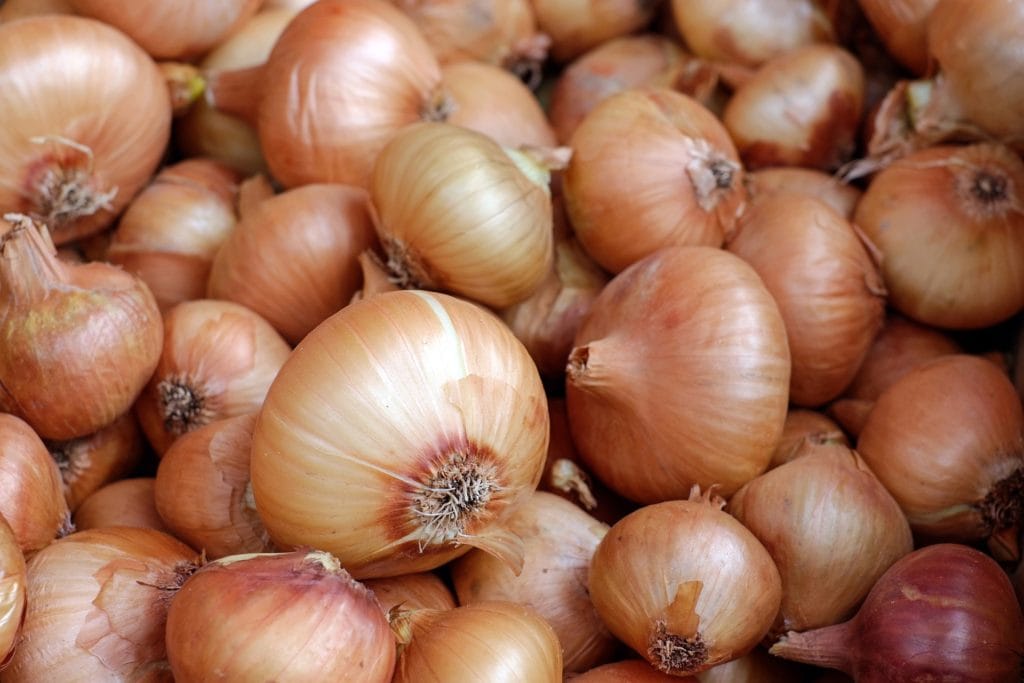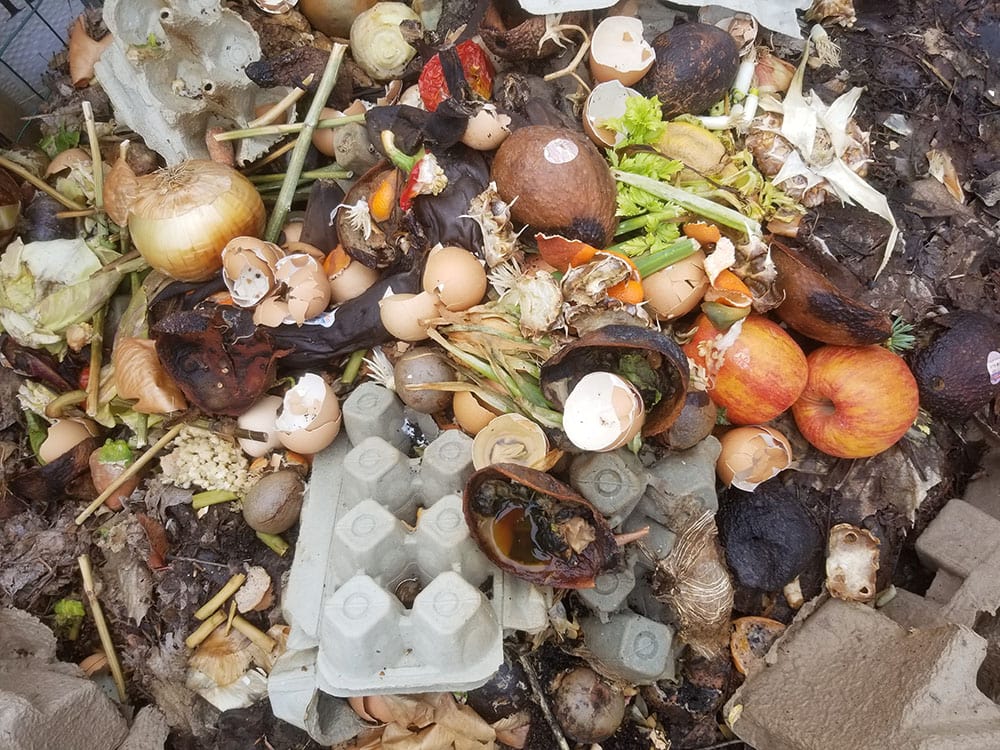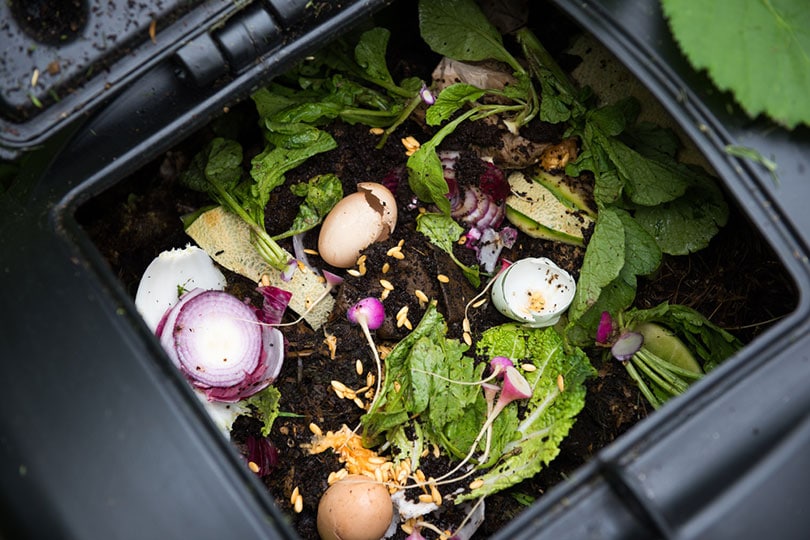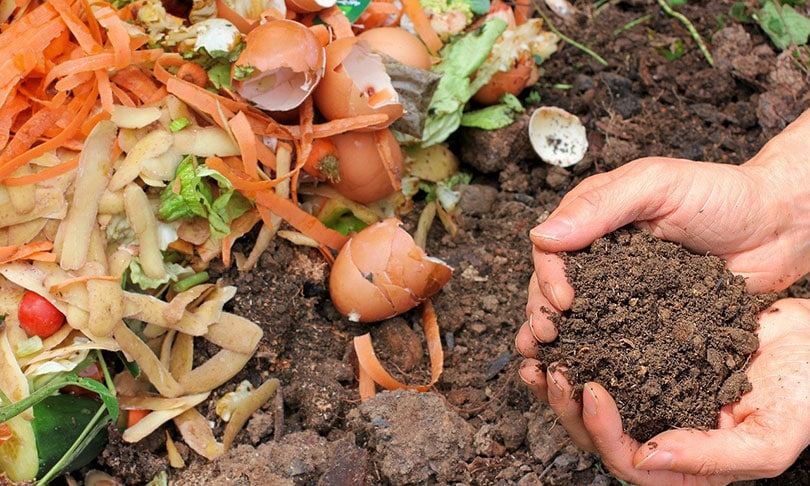Can I Compost Onions? Tips, Types & How to Guide
-
Pete Ortiz
- Last updated:

Composting is a great way to create organic fertilizer to use in your garden. While it’s possible to compost many types of vegetables, what about onions?
Many people think onions aren’t compostable because of the strong smell. However, you can compost onions since they’re vegetables. The only point to note is the strong, pungent smell, which can become a nuisance after some time.
Still, if you overlook that, you can make some quality organic fertilizer when you compost onions. This article shows you how to compost onions and a few tricks for the best results.
Role of Onions in Compost
Onions are vegetables that people use in the kitchen almost daily. They are useful not only in cooking but for many other purposes, such as composting.
However, before adding onions to your compost, consider the smell. Onions are known to be some of the most pungent vegetables. If
the smell isn’t an issue, then it’s quite okay to add onions to your compost pile. This adds to the green waste that you need for healthy compost.
Note that onions have a low pH, making them highly-acidic vegetables. So, consider the pH level of your compost when adding them. These can be great when you want to delay composting since they will slow down the composting bacteria and other grubs.
Also, onions can help you balance out your compost in a natural way. Given that most compost tends to be alkaline, adding onions that are highly acidic gives you a perfect balance. However, ensure you don’t add too many onions in one heap.

Should I Compost Whole Onions or Peels?
Whole onions are good to add to the compost. However, it’s better to add peels. Remember, whole onions often produce shoots. Also, because of the size, these can take longer to decompose.
The smaller the pieces, the faster onions decompose into the compost
Are Moldy Onions Good for Compost?
Do you have some onions that have been in your kitchen so long that mold has started growing? Are you considering adding these moldy onions to your compost pile? Well, you can go right ahead.
Moldy onions aren’t ideal for cooking, but they’re excellent for the compost pile. When you start to see mold forming on the onions, know that the process of decomposition has already begun. So, adding them to the compost makes sense because decomposition is the whole point.
It’s not uncommon to find mold growing inside of your compost bin. This is a sign of natural decomposition taking place. Therefore, tossing in the moldy onions means one item is already on its way to becoming nutritious compost.
Are all onions suitable for the compost bin?
Which Type of Onions Should Never End Up in the Compost?
When composting different items, note that not everything is meant for the compost bin. For instance, if you come across some diseased onions in a batch, never add them to the compost bin.
Diseased onions and other diseased plants can infect your compost. This is bad because the disease gets transferred to your plants when you use the compost in your garden.
Some common onion diseases include white rot, mildew, and leaf blight. When you detect any of them, toss those onions in the garbage bin. It’s better not to risk the health of your compost and plants, so avoid diseased onions at all costs.
In addition, it’s better not to add any cooked onions that you have left over in the kitchen. When cooking onions, you’re most likely using oils or fats. When you add these onions to the compost, it’s hard for the oils and fats to break down.
Also, cooked food in the compost tends to attract pests, like rats. When rats attack your compost, you won’t like the mess that these rodents create. Plus, rat droppings carry diseases, which can transfer to your compost and then to your garden beds.

How to Compost Onions
Composting follows several steps to get the best outcome. However, one rule is to always compost smaller chunks of each material you add. If you use lots of vegetables, make sure you chop them up. The same applies to the brown material you use in your compost.
Smaller matter takes a shorter time to decompose, unlike huge chunks. One important thing to know is that you should never add onions when vermicomposting. The worms won’t break down the onions given the pungent smell they emit.
- Pick your composting spot in your yard or home. Keep in mind that composting takes time, so don’t pick an area that you want to use in the near future. A corner in the yard can be the best spot to start your compost heap.
- Get a composting bin that will fit the amount of matter you want to add. There are specific composting bins that you can buy. After that, use a drill to create about five holes in the bin. Space out the holes from top to bottom randomly so that these permit as much air circulation as possible.
- Gather the onions and chop them into smaller pieces for faster decomposition. If not, you can unpeel the onions and slice the peels. Chopping is also an effective way of ensuring the onions don’t start bearing new shoots while in the compost bin.
- Use some cardboard or newspaper as part of the brown material. These two are excellent for controlling the pungent smell of onions. Cardboard and newspapers do decompose, so they are excellent additions to the compost pile.
- Add the onions into the compost bin and bury them deep. You can add other vegetables and brown materials to create the best compost. Also, remember to pour some water on the compost piles at each level to assist with decomposition.
- Keep turning the compost and add soil to it. You can do this once a week while also inspecting the state of the compost.
- When the compost is ready, you can add it to your plants or soil. The compost will start feeding your plants with lots of nutrients slowly. If plants are already growing, it’s a great top-dressing material to keep them healthy and productive.
Even with the step-by-step process, there are some tips that can help you create the best onion compost.
The 6 Tips for Composting Onions Are:
1. Have a Balance of Greens and Browns
The best way to create compost is by having green and brown material. When one lacks, it’s not possible to get healthy compost. When you want to decompose onions, ensure you have an equal amount of cardboard, newspaper, or other brown materials.

2. Keep an Eye on the Fungi Levels
Fungi is essential for decomposition, but it can also encourage mushroom growth. While this isn’t too bad, always note that some mushrooms are toxic. So, you can prevent this growth by ensuring there’s proper airflow in the compost bin.
3. Bury Onions Deep to Control the Smell
Onions have a strong smell. If you want to control this, bury the onions about 12 inches deep in the compost pile. On top of the onions, add brown materials, like newspapers and cardboard. As you turn the compost, ample airflow is also ideal for controlling the strong odor.
4. Avoid Glossy Paper
Glossy paper, like the paper from magazines, is good for crafts and other purposes at home. However, you should never use it as part of the brown materials in a compost bin. The coatings and colors in glossy paper are toxic and make your compost unhealthy.

5. Remove Labels and Wrappers
If your onions have labels or if they come in a plastic net, remove both before adding them to the compost pile. The plastic netting and labels aren’t biodegradable, not unless it’s stated on the label. The small stickers are easy to miss, so ensure you look at all the green matter before adding it to the compost bin.
6. Use a Bin With a Lid
Open compost piles are fine, but one issue you might encounter is dealing with pests. Rodents love to feast on the kitchen scraps in a compost pile. This can cause a huge mess and even affect the quality of your compost. So, it’s better to invest in a quality composting bin with an effective lid.
Conclusion
Onions are part of the green matter that you can add to your compost pile. These vegetables do have a foul smell, but they can do a lot of good for your compost. Since most compost is alkaline, the highly acidic onions help to balance the pH levels in the pile.
If you have some moldy onions, toss them into the compost as well. However, avoid onions with diseases or those that are cooked with oils or fats. Diseased onions in the compost can infect your plants later. As for cooked onions, it’s hard for the oils and fats to decompose.
Now you know that onions are ideal for composting, so do not hesitate to add them.
Featured Image Credit: 1195798, Pixabay
Contents



